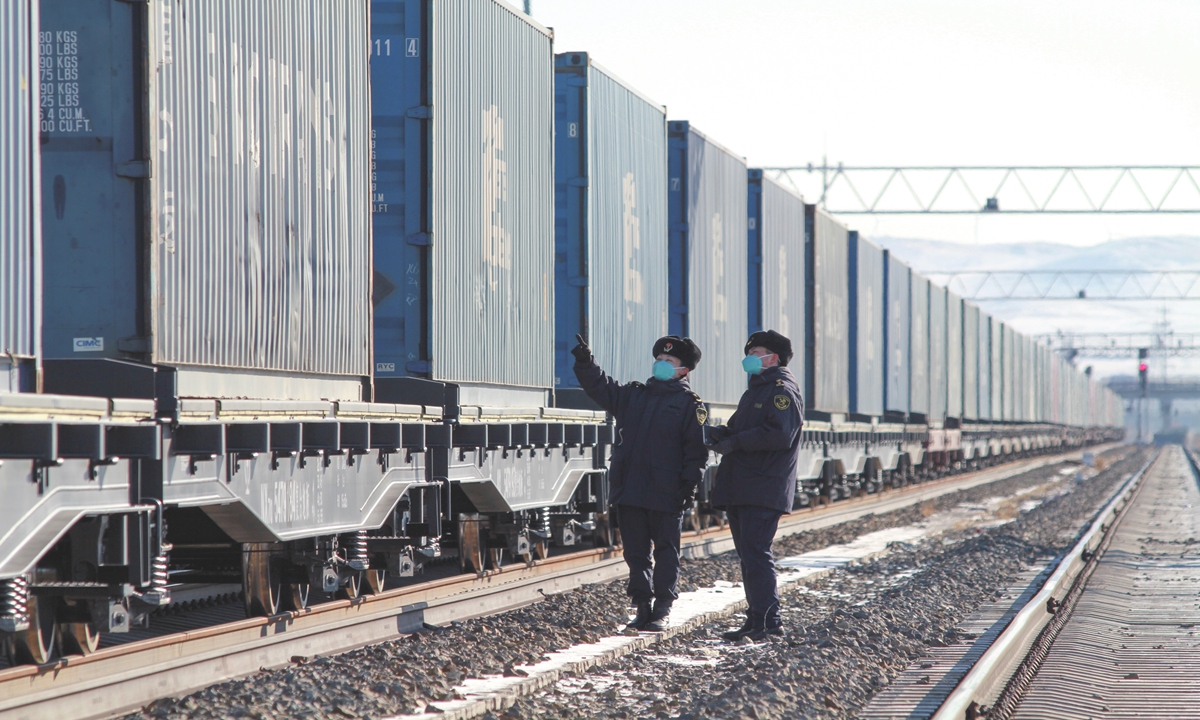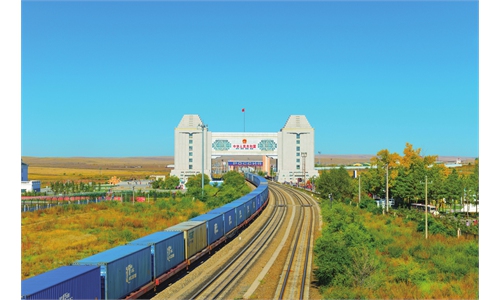Decade of rapid expansion in China-Europe rail service attests to achievement of BRI

Manzhouli port customs officers inspect the China-Europe train at the Manzhouli port. Photo: Courtesy of Zhang Liping
Editor's Note:
In 2013, Chinese President Xi Jinping put forward the "Belt and Road Initiative" (BRI), aiming at building a new platform for international cooperation and creating new momentum for shared development. Since then, the BRI has opened a path for high quality development and common prosperity for countries along the route, becoming a real global platform serving more than half of the world's population.
While developing rapidly over the years, China has also made great contribution to global connectivity under the initiative, helping build a mega global transportation network covering road rail and sea ways and integrating a number of countries into the global supply chain.
The Global Times is publishing a series of stories, helping the world understand how BRI facilitates connectivity and foster growth. Among the good examples are the booming auto trade business between China and Europe buoyed by the resilient China-Europe freight train service.
The sixth anniversary of the opening of the train service falls on June 20, and the Global Times interviewed senior traders in corresponding industries, who shared how the cross-continental train service has become an increasingly important player in enhancing China-Europe trade.
This is the second in a series about a monumental decade for BRI.
By GT staff reporters
A China-Europe freight train with more than 100 cars produced by Great Wall Motors of China, departed from Chongqing city in Southwest China on Wednesday and will be shipped abroad via Alashankou Port, a major border port in China. The train is the very first train from Chongqing heading to Europe specially used to transport the vehicles of Great Wall Motors, which serves as the latest example of the fledgling auto trade.
Since 2017, China-Europe freight train service starting from Chongqing have transported a total of 15-billion-yuan worth of imported and exported vehicles, promoting the deep integration of the vehicle industry chain along the Belt and Road Initiative route.
Driven by the trend of booming auto business between China and Europe, Chinese high-tech companies including BYD and TCL Technology have opened factories in Poland, Hungary, the Netherlands, and other locations in Europe in recent years to meet the expanding needs of the consumers there, while China-Europe trains have become an important means for transport between China and Europe.
Since 2016, more than 90 percent of the parts and components required by the six key production lines of the TCL assembly base in Poland have been transported via China-Europe freight train service, boosting local inventory and market response capabilities.
The China-Europe freight train service's boost for the auto industry is just part of how the 13,000-kilometer cross-continental transport line linking China and Europe has played a foundational role in stabilizing global supply chain, while injecting new momentum to growing each other's economy under BRI.
From 2016 to 2021, the annual number of China-Europe freight trains increased from 1,702 to 15,183, with an average annual growth rate of 55 percent while the annual value of goods transported rose from $8 billion to $74.9 billion, a nine-fold increase. Moreover, the rail service's share of total trade between China and Europe rose to 8 percent in 2021 from 1.5 percent, helping their supply chain stability.
The ever-expanding China-Europe freight train service and the ever closer connectivity between China and Europe as well as between Asia and Europe attest to the remarkable achievement over the past nine years or so of the China-proposed BRI, which aims to build an open platform of cooperation, and providing new impetus for cooperation and development among countries.
Growing rail service
With a decade-long experience in providing the one-stop service for multimodal transport of China-Europe trains, Tommy Tan, president of Shanghai EPU Supply Chain Management Co, an agent for China-EU freight trains, is an eyewitness of how the freight train service has become the bedrock for enlarging China-Europe trade.
Tan's business involves a wide variety of trade categories, such as timber trade between China and Russia, grain and fertilizer trade between China and Kazakhstan, and auto parts trade between China and Europe.
Starting in 2018, they have imported about 40 containers from Nuremberg to Chengdu, Southwest China's Sichuan Province on a weekly basis, involving all accessories except batteries and air bags for BMW's factories in China.
The company's trade service has been successfully operating for four years, with a total of 200 trains being launched, and a total import value surpassing 10 billion yuan, significantly supporting BMW's local production, according to Tan.
Impacted by the breakout of the Ukraine crisis, the train service has been suspended for more than two months, Tan said, adding they are negotiating to prepare for the rail service's resumption.
Rise to challenge
Despite the military conflict in Europe and the COVID resurgence in China , which have thrown an element of uncertainty into cross border trade, the China-Europe freight train service has remained resilient, being an effective supplement to sea freight.
Sources told the Global Times that since the first China-Europe train carrying Audi cars arrived in Xi'an from Bremerhaven in October 2020, the epidemic situation has been constantly changing. But the train service has always been well managed.
When Western sanctions against Moscow over the Russia-Ukraine conflict created unprecedented challenges for cross-border trade, many European companies are chipping away at the potential risks of disruption for logistic services.
The China-Europe freight train remains a leading option for many international traders, given its competitive advantage, especially as the sea transport experienced a severe bottleneck last year - as port backlog has lingered in many European ports.
A trader connected to the China-Europe freight train based in Yiwu, Zhejiang Province, who has always been a big supporter of the cargo train service, told the Global Times on Thursday that from Hamburg Port in Germany to Ningbo Port, import transportation takes 55-65 days, while the train service takes only 18 days, and the price has remained stable at around $1,000, similar to ocean freight.
While there are multiple factors that contribute to low cost, the high efficiency of Chinese ports certainly plays a part. For example, at Manzhouli port, North China's Inner Mongolia Autonomous Region, a major border port for the rail service, the customs has ensured that the train is available for inspection 24 hours a day, which greatly reduces the time cost of each link in the customs clearance, the Global Times learned.
Now, there are 57 China-Europe trains entering and leaving the country through the Manzhouli railway station, reaching 13 countries and 28 cities in Europe. The goods include auto parts and other varieties.
Given the competitive edge, there has been hardly any disruption to the train service even with the geopolitical tensions in Europe, industry analysts say.

